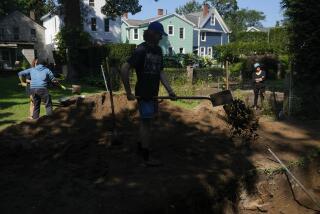Wilbert Oliver; Sued to Halt Mortuary Discrimination
- Share via
Wilbert Jean Oliver wanted to give his mother a proper funeral. But for blacks in the rural South in the early 1970s, that often was not a simple matter.
He approached the white-owned Escude Funeral Home, the only mortuary in his hometown of Mansura, La. The firm would embalm his mother, but it refused to allow her wake to be held on its premises because she was black.
The pain of Escude’s refusal went deep. The indignity was doubled by the fact that Oliver’s mother, the community midwife, had delivered and nursed some of the Escude children and was considered a family friend.
Oliver, who died at age 89 in a Marksville, La., hospital Aug. 17, sought to right that wrong as the lead plaintiff in a 1973 federal class-action lawsuit that alleged unequal treatment of blacks and whites in two local funeral homes.
He won the case, scoring a legal victory that helped to end discriminatory practices in funeral homes around the country.
Raised in Mansura, a small town about 70 miles northwest of Baton Rouge, Oliver was a laborer who lost an arm in a factory accident and later turned to farming cotton.
When blacks in Mansura died, their families had few options. They could go to a black-owned funeral home about 10 miles out of town, but that was far enough away to pose a hardship for poor families who didn’t have reliable transportation.
The two closest mortuaries, Escude in Mansura and Hixson Bros. Funeral Home in nearby Marksville, were white-owned.
When Martha Pierre Oliver died in 1971, Wilbert Oliver turned to undertaker Joseph Escude Jr., who knew the Olivers well.
Unlike many white-owned mortuaries, the Escude Funeral Home had been embalming blacks since its founding in 1928.
But, no, it could not hold the wake. That was just the custom, Escude said.
Hixson Bros. would not handle black bodies at all.
Oliver ended up holding the visitation in what the lawsuit called “a run-down storage building” on the grounds of a local black church.
According to the suit, Escude offered to cover the church rental costs. But he still charged Oliver the same total fee as he charged whites, who were not forced to hold their wakes elsewhere.
The circumstances in Mansura were typical of many areas of the rural South at the time, according to Oliver’s lawyers at the Southern Poverty Law Center.
Blacks often had to do without embalming their dead, which was illegal in many states. If they found a mortuary that would perform the embalming but refused to allow visitation, they could hold the wake at home but were forced to pay the mortuary’s full price.
“It was not giving equal service for the same amount of money,” said Father August Thompson, who was Oliver’s priest when his mother died.
Thompson called Joseph Escude Jr. a good man. “He was the only white funeral home operator [in the area] who would embalm blacks,” Thompson said. “But when you looked at it, it was something to laugh at: They would embalm a black person in the same room as a white person, but not allow the wake.”
The inequity, he said, came from not wanting to “buck the comfort zone.”
At Oliver’s urging, Thompson tried to find a local attorney who would take the funeral homes to court but found that “no lawyer wanted to touch it.” The priest finally approached the Southern Poverty Law Center, which agreed to take the case.
The suit alleged that the Escude and Hixson Bros. funeral homes had violated a federal law that prohibited discrimination against blacks in contracts.
Finding that the facts in the case were not disputed by Escude or Hixson Bros., a federal district judge handed down a summary judgment within a month that declared the undertakers’ actions unconstitutional. They were ordered to pay $1,000 in damages to each plaintiff.
Although it did not go to the Supreme Court, the ruling “served a precedential purpose,” said Morris Dees, the crusading civil rights attorney who co-founded the Southern Poverty Law Center and was a member of the original legal team on the case.
After the ruling was announced, Dees said, the center received reports that funeral homes across the country were changing their practices and offering a full range of services to blacks.
“It sent a message to other funeral homes that it was not a good idea to [discriminate against blacks], because they would be hit by legal fees,” Dees said. “They would be violating the law.”
Escude, who still runs the only funeral home in Mansura, said in an interview this week that he did not contest the lawsuit 26 years ago. “It was a matter of discrimination,” he said, adding, “We knew we’d lose.”
Back then, he said, “nobody was putting blacks in white funeral homes.” Since the case with Oliver was settled, “we’ve been burying the whole family ever since.”
Oliver was “very courageous” to battle the white funeral home operators, Thompson said. “He’s the one who said, ‘We’ve got to sue them.’ He was upset for his mama.”
Martha Oliver’s son was buried Saturday. Escude directed his memorial services, which included a wake held at the Mansura funeral home.
Survivors include Oliver’s wife of 69 years, Catherine Carmouche Oliver, three sons, six daughters, 39 grandchildren, 72 great-grandchildren, and 13 great-great-grandchildren.
More to Read
Sign up for Essential California
The most important California stories and recommendations in your inbox every morning.
You may occasionally receive promotional content from the Los Angeles Times.














